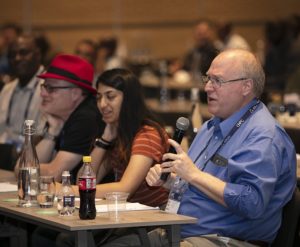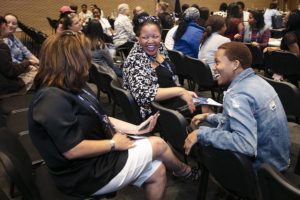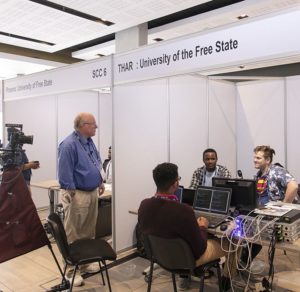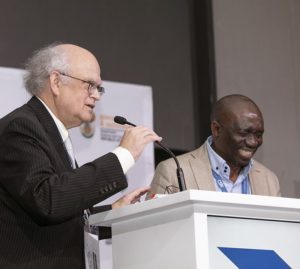 In this podcast, the Radio Free HPC team looks back at the highlights of the 2018 CHPC Conference in South Africa. With over 500 attendees, the event featured a set of keynotes on high performance computing as well as a Student Cluster Challenge and a Cyber Security Competition.
In this podcast, the Radio Free HPC team looks back at the highlights of the 2018 CHPC Conference in South Africa. With over 500 attendees, the event featured a set of keynotes on high performance computing as well as a Student Cluster Challenge and a Cyber Security Competition.
The comprehensive program included national and international contributions as well as contributions from cyberinfrastructure system partners: the South African National Research Network and the Data Intensive Research Initiative of South Africa. Captains of the HPC Industry across the globe provided key talks and workshops during the conference week and they included: Patricia Damkrogel, Vice President and General Manager of Intel, Thomas Sterling from Indiana University, USA; Michael Foley who has recently retired from the World Bank, Bhekisipho Twala from the University of South Africa, Khutso Ngoasheng from the South African Radio Astronomy Observatory, Elmarie Biermann from the Cyber Security Institute and many others.
 The SADC HPC Collaboration Forum participated in discussions around the HPC framework and implementations plans for a regional HPC facility that would be used to find scientific solutions for common problems and other research in which member states could collaborate.
The SADC HPC Collaboration Forum participated in discussions around the HPC framework and implementations plans for a regional HPC facility that would be used to find scientific solutions for common problems and other research in which member states could collaborate.
This year, following the theme of the conference on how HPC Transforms for the Future, increasing the participation of women in HPC was prominent. This was supported by the introduction of a sponsorship for an outstanding female in the Student Cluster Challenge. The award in this newly introduced category, sponsored by Intel, was taken by Ms. Mapule Madzena, a student from the University of the Free State. She was hailed as the best female student and walked away with R64 500.
 Student Competition Highlights included:
Student Competition Highlights included:
- Six students from the University of Cape Town (UCT) and the University of the Witwatersrand (WITS), who came out tops at a national student cluster competition to build a supercomputer, will fly the South African flag high at the International Student Cluster competition in Germany, in June next year.
- During the competition, 10 teams of students from various universities in the country battled it out to build small high performance computing clusters on the exhibition floor – using hardware provided by CHPC and its industrial partners – and raced to demonstrate the best performance across a series of benchmarks and applications.
- Sefan Schroder, Dilon Heald, Jehan Singh and Clara Staasen from UCT; Anita de Mello Koch and Kaamilah Desai from WITS, will test their skills against their international counterparts’ when they compete with students from 11 countries that including China, Germany, Poland, Singapore and Thailand, among others.
- In the cybersecurity challenge, the University of Pretoria came first, followed by Stellenbosch University. This competition provides a platform for students to compete in real-time and come up with ideas that could protect South Africa from cybercrimes. The winning team will compete at an appropriate international competition, such as the European Cyber Security Challenge.
Speaking at the conference, DST Chief Director: Emerging Research Areas and Infrastructure, Dr Daniel Adams, said that the event was critical to develop the skills needed in the country.
The DST remains committed to supporting skills development and new interventions. The CHPC is a great platform to stimulate the pipeline and boost human capital development. Initiatives such as these have led to slow, but steady, improvement in the enrollment of doctoral degrees,” he said.
 CHPC Director, Dr Happy Sithole was impressed with the calibre of student who participated in the competitions. “I am very proud of the kind of innovation displayed by the students. I believe that they will represent us well at international stages.These competitions are critical to equip the future generation with cyberinfrastructure, supercomputing experience and expose science, technology, engineering, mathematics and innovation students to an array of opportunities”.
CHPC Director, Dr Happy Sithole was impressed with the calibre of student who participated in the competitions. “I am very proud of the kind of innovation displayed by the students. I believe that they will represent us well at international stages.These competitions are critical to equip the future generation with cyberinfrastructure, supercomputing experience and expose science, technology, engineering, mathematics and innovation students to an array of opportunities”.
Over the years, South Africa has performed well at the International Student Cluster competition, wining it in 2013, 2014 and 2016, while coming second in 2015 and 2017. In June this year, the team came third, after two teams from China at the cluster challenge in Frankfurt, Germany.
Dr Sithole was also pleased with the progress made in building a strong high performance computing community in the country.
This year, our focus was on the transformation of both the use and development of cyberinfrastructure, which will help the industries, academics and the nations from across the continent. Looking back at the first meeting where we engaged in the discussions of building a strong high performance computing community in South Africa, and advocating for financial support from government, significant growth has been achieved. Notably, it is now a continental focus, not only on computing, but overall cyberinfrastructure growth and demonstration of impact”, he said.
Student Poster Competition
The conference also had 60 students showcasing their research posters for work conducted through the use of high performance computing. The poster students were judged mostly by external adjudicators under the following criteria: quality of the poster, the high performance computing content and quality of research, their ability to communicate the science content and the general impression of the presentation. The winner of the Masters-level poster was Beauty Shibiri from the University of Limpopo for the abstract title: Investigating the Structural and Volume Changes of Composite Layered-Spinel Nanoporous Li-Mn-O Electrode Materials. In the Doctoral-level, the award went to Elkana Rugut from WITS for the abstract title: Thermoelectric Properties of CdAl204 spinel.
Exhibition area
The expo zone of the conference consisted of industries who provided valuable support to the funding of the conference, companies like Intel (diamond sponsor), Altair and Dell EMC (platinum sponsors) and Mellanox and Hewlett Packard (gold sponsors) ensured that the CHPC is able to bring leading speakers to add to the stature of the conference.
In this video from the 2018 CHPC Conference, Trish Damkroger from Intel describes how the company is advancing the use of high performance computing on the African Continent.
Other sponsors included Student Cluster Competition sponsors: DELL EMC, Eclipse Holdings, Altair, Bright Computing, Mellanox, Microsoft and Intel; as well as Student Cyber Security Challenge sponsors: Microsoft and MWR.
Please visit the gallery to see more photos from the conference.




